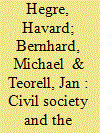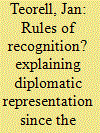|
|
|
Sort Order |
|
|
|
Items / Page
|
|
|
|
|
|
|
| Srl | Item |
| 1 |
ID:
165850


|
|
|
|
|
| Summary/Abstract |
We attempt to integrate the literatures on authoritarian regime types and democratic forms of government. We propose a theoretical framework of five dimensions of executive appointment and dismissal that can be applied in both more democratic and more authoritarian regimes: the hereditary, military, ruling party, direct election, and confidence dimensions, respectively. Relying on the Varieties of Democracy data, we provide measures of these five dimensions for 3,937 individual heads of state and 2,874 heads of government from 192 countries across the globe from 1789 to the present. After presenting descriptive evidence of their prevalence, variation, and relationship to extant regime typologies, a set of exploratory probes gauge the extent to which the five dimensions can predict levels of repression, corruption, and executive survival, controlling for aspects of democracy. This leads to generation of a set of original hypotheses that we hope can serve as building blocks for explanatory theory. We conclude by discussing some limitations of these novel data.
|
|
|
|
|
|
|
|
|
|
|
|
|
|
|
|
| 2 |
ID:
173765


|
|
|
|
|
| Summary/Abstract |
We theorize that three distinct structures of democratic constraint explain why more democratic dyads do not engage in military conflict with each other. We build on earlier theories that focused on electoral and horizontal accountability. We add a new dimension—the social accountability provided by an active civil society. Using several new measures from the Varieties of Democracy (V-Dem) data set, we stringently test these explanations. We find social accountability to be the strongest and most consistent predictor of nonbelligerence in dyads, that horizontal accountability is still important, but that the independent role of electoral accountability has been somewhat overstated. However, we do find that social and electoral accountability work strongly together, to make for an even greater effect. The finding is robust to a range of specifications and in the face of controls for contending theories that challenge the democratic peace (e.g., the capitalist and territorial peace theories).
|
|
|
|
|
|
|
|
|
|
|
|
|
|
|
|
| 3 |
ID:
140813


|
|
|
|
|
| Summary/Abstract |
According to the classical perspective, polity size and democracy are inversely related. In this article, we argue that there is an important exception that manifests itself at the district level in settings where multiparty competition is allowed. Specifically, we find that larger districts encourage greater contestation. This results from a little-noticed mechanical effect as well as from several features of constituencies that are affected by size and have direct repercussions for contestation. To demonstrate this thesis we assembled a unique dataset, the Multi-level Election Archive (MLEA), which unites electoral contests across a variety of districts (national, regional, and local) and elective offices from the eighteenth century to the present, including a total of 88 countries, 2,344 elections, 79,658 districts, and more than 400,000 contests. With this evidence we were able to conduct a broad array of statistical tests, some global and others focused on particular countries or election types, all of which support our general argument.
|
|
|
|
|
|
|
|
|
|
|
|
|
|
|
|
| 4 |
ID:
166004


|
|
|
|
|
| Summary/Abstract |
The Historical Varieties of Democracy dataset (Historical V-Dem) contains about 260 indicators, both factual and evaluative, describing various aspects of political regimes and state institutions. The dataset covers 91 polities globally – including most large, sovereign states, as well as some semi-sovereign entities and large colonies – from 1789 to 1920 for many cases. The majority of the indicators come from the Varieties of Democracy dataset, which covers 1900 to the present – together these two datasets cover the bulk of ‘modern history’. Historical V-Dem also includes several new indicators, covering features that are pertinent for 19th-century polities. We describe the data, coding process, and different strategies employed in Historical V-Dem to cope with issues of reliability and validity and ensure intertemporal and cross-country comparability. To illustrate the potential uses of the dataset we describe patterns of democratization in the ‘long 19th century’. Finally, we investigate how interstate war relates to subsequent democratization.
|
|
|
|
|
|
|
|
|
|
|
|
|
|
|
|
| 5 |
ID:
190856


|
|
|
|
|
| Summary/Abstract |
The aim of this article is to explore the establishment of diplomatic representation as a measure of de facto recognition by other state units and to explain its causes in the “long 19th century” (1817–1914) and the post–World War II (WWII) era (1950–2000). Drawing on the Correlates of War diplomatic exchange data, the article explores the underlying drivers of dyadic acts of recognition in two series of logistic regression analyses, one for each time period. The results indicate that, also when taking alternative explanations into account, recognition of other states in the international system was in the 19th century at least based on one general principle: that of recognizing other de facto states. In the post-WWII era, contrary to expectations, this principle was still in effect. De facto statehood can thus be argued to constitute a rather stable norm for recognition in the international system.
|
|
|
|
|
|
|
|
|
|
|
|
|
|
|
|
|
|
|
|
|